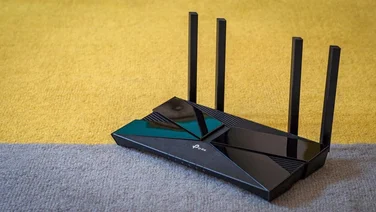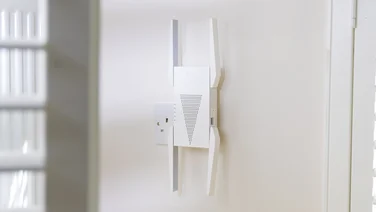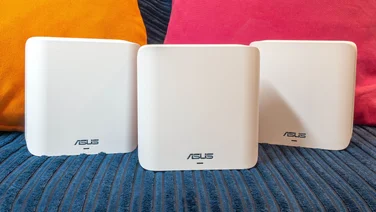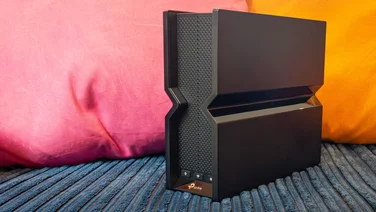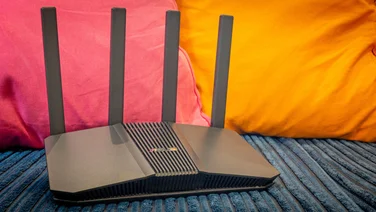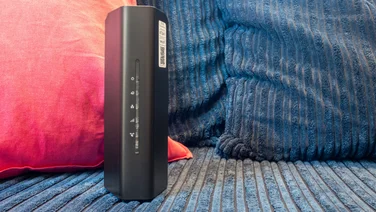To help us provide you with free impartial advice, we may earn a commission if you buy through links on our site. Learn more
- Best mesh Wi-Fi router: At a glance
- How we test mesh Wi-Fi routers
- 1. Best-value Wi-Fi 6 mesh: Mercusys Halo H80X
- 2. Best value Wi-Fi 7 mesh: Negear Orbi 770
- 3. Best mid-range mesh Wi-Fi router: Asus ZenWiFi XD5
- 4. TP-Link Deco X20: Easy to use and affordable
- 5. Best affordable Wi-Fi 6E mesh: TP-Link Deco XE75 AXE5400
- 6. The fastest Wi-Fi 6E mesh – but it’s expensive: Netgear Orbi RBKE963
- 7. Best premium Wi-Fi 7 mesh: Amazon Eero Max 7
- How to choose the best mesh Wi-Fi router for you

Fed up with flaky Wi-Fi? We’ve tested dozens of mesh Wi-Fi routers: choose one of our top picks and you can enjoy a superfast connection in all corners of your home.
These extensible kits cover a huge area, and since you can locate the units wherever you want – and even add extras – you can be certain of getting a strong signal where it’s needed. We put each one through its paces to confirm that performance is top-notch, leaving traditional extenders in the dust.
Here’s our guide to the best whole-home mesh Wi-Fi kits on the market – the models that provided the best range and the fastest coverage in our real-world tests. We’ve included a comprehensive buyer’s guide, too, so you’ll know what features to look out for. Read on to find the mesh networking system that will wash away your wireless blues.
Amazon Prime Day savings are open to Prime subscribers only. The good news is that you can sign up to a 30-day free trial if you don’t want to commit to the monthly cost.
Best mesh Wi-Fi router: At a glance
| Best value | Mercusys Halo H80X | |
| Best mid-range | TP-Link Deco X20 | |
| Best affordable Wi-Fi 6E system | TP-Link Deco XE75 | |
| Best value Wi-Fi 7 mesh | Orbi 770 |
How we test mesh Wi-Fi routers
We test mesh Wi-Fi systems by setting them up just as you would in a regular home. The primary unit is connected to an incoming fibre broadband line, while the second is located one or two rooms away according to the manufacturer’s recommendations. If there’s a third node, this will be placed in another room, creating either a star or daisy-chain topology.
Setup and features: We work through the configuration process, using the mobile management app if one is provided. We note how quick and easy it is, and try out any additional features, such as USB connectivity, parental controls or integrated network security functions.
Performance: For performance testing, we connect a NAS (network attached storage) appliance to the main mesh unit via Ethernet, and then wirelessly connect to the mesh network from a laptop supporting the latest wireless standards.
We take this laptop to various rooms, copy a series of files to and from the NAS system and measure read and write speeds to discover peak performance at different ranges and via different mesh stations. We also measure the power consumption of each unit.
Value for money: Finally, we weigh performance and features against price, and compare each system to its rivals, to come up with an overall rating for each mesh system.
1. Best-value Wi-Fi 6 mesh: Mercusys Halo H80X
Price when reviewed: £134 (three nodes) | Check price at Amazon

- Great for… strong whole-home Wi-Fi at a fair price
- Not so great for… those seeking maximum performance
The Halo H80X is a fantastic debut from TP-Link’s value-oriented Mercusys brand – a full-featured Wi-Fi 6 mesh system for a great price.
It isn’t quite the fastest mesh around. It doesn’t support the newest 6GHz technology (you need a Wi-Fi 6E system for that) and its dual-band design means its wireless capacity has to be shared between your devices and internal mesh traffic.
Even so, with high-bandwidth 160MHz channels and 2×2 MU-MIMO, the Halo H80X can deliver very strong performance. We measured download speeds as fast as 80MB/sec at short range, and no matter where we roamed around the house the connection never dropped below 35MB/sec. For smaller homes, you can get a two-node system for just £50 less.
The feature set is decent, too. Each Halo unit has three gigabit Ethernet ports, and the accompanying mobile app lets you prioritise specific clients, filter websites by category and set time limits and schedules for kids’ devices. Everything most people need is here, with performance to spare – and it’s well worth keeping an eye on sale prices, as we’ve frequently seen the system discounted to below £100.
Read our full Mercusys Halo H80X review
Key specs – Nodes (as reviewed): 2; Claimed coverage: 460m²; Maximum nodes supported: Not stated; 2.4GHz speed: 574Mbits/sec; 5GHz speed: 2,402Mbits/sec; MIMO channels: 2×2 on each band; Ethernet ports: 3 x GbE per node
Also consider:
- Xiaomi Mesh System AX3000: Another effective and affordable 2-node Wi-Fi 6 mesh | Check price at Xiaomi
- D-Link M15 Eagle Pro AI AX1500: Not as quick as the H80X, but still effective
2. Best value Wi-Fi 7 mesh: Negear Orbi 770
Price when reviewed: £400 (two nodes) | Check price at Amazon

- Great for… futureproofing your home network
- Not so great for… your bank balance
Wi-Fi 7 network hardware is coming down in price, but it’s still a lot more expensive than Wi-Fi 6 kit and, to date, we’ve not seen a big boost when it comes to performance. Still, this system from Netgear is almost affordable and we found performance to be pretty good.
The two-node system we tested delivered very fast download speeds in all areas of our test home (save the kitchen), and although this performance might not transform your home network over a cheap system like the Mercusys Halo H80X, it’s fast enough for almost any domestic application and future-proof, too.
Read our full Netgear Orbi 770 review
Key specs – Nodes (as reviewed): 2; Claimed coverage: 418m²; 2.4GHz speed: 688Mbits/sec; 5GHz speed: 4.3Gbits/sec; 6GHz speed: 5.8Gbits/sec; MIMO channels: 2×2 on each band; Ethernet ports: Router node – 4 x 2.5Gbits/sec, Satellite node – 2 x 2.5Gbits/sec
3. Best mid-range mesh Wi-Fi router: Asus ZenWiFi XD5
Price when reviewed: £182 | Check price at Amazon

- Great for… feature-packed, multi-room Wi-Fi
- Not so great for… maximum performance or coverage
The Asus ZenWiFi XD5 is a compact mesh system that offers not only strong performance and range but also a huge selection of features. It’s crammed with tools that give you fine control over your home network, whether you use the app or the web portal, and it includes both parental controls and network security for free, where some other systems charge a subscription fee.
In our tests, we found the XD5 wasn’t the fastest of meshes at close range, but there’s enough performance here for most people’s needs. It’s also worth noting that this two-unit bundle doesn’t match the range of some pricier three-node kits, but again it will provide solid coverage throughout a typical home. For less than £200 it’s a very persuasive offering.
Read our full Asus ZenWiFi XD5 review
Key specs – Nodes (as reviewed): 2; Claimed coverage: 325m²; 2.4GHz speed: 574Mbits/sec; 5GHz speed: 2.4Gbits/sec; MIMO channels: 2×2 on each band; Ethernet ports: 2 x GbE per node
4. TP-Link Deco X20: Easy to use and affordable
Price when reviewed: £220 | Check price at Amazon

- Great for… good-value long-range wireless coverage
- Not so great for… top speeds or wired connectivity
A worthy rival to the Asus ZenWiFi XD5, TP-Link’s Deco X20 delivers three nodes for a similarly appealing price. That gives you extra flexibility to ensure your Wi-Fi signal reaches the areas where you need it.
It’s a dual-band system supporting 2×2 MIMO, which helps to keep the costs down; in our tests it delivered solid mid-level performance, not blowing away the competition but never falling to the back of the pack either.
Ease of use is a particular strength of the Deco X20. Everything is managed via the excellent TP-Link Tether app, which offers an unusually broad selection of features, including baked-in parental controls and antivirus protection for the whole of your network.
Physical connectivity is a tad limited. Each X20 node has only a pair of network ports, with no USB sharing or even a WPS button. For the price, though, the TP-Link Deco X20 is a great system with plenty of features and fast enough speeds for daily life.
Read our full TP-Link Deco X20 review
Key specs – Nodes (as reviewed): 3; Claimed coverage: 372m²; Maximum nodes supported: Not stated; 2.4GHz speed: 574Mbits/sec; 5GHz speed: 1,201Mbits/sec; MIMO channels: 2×2; Ethernet ports: 2 x GbE per node
5. Best affordable Wi-Fi 6E mesh: TP-Link Deco XE75 AXE5400
Price when reviewed: £350 (three nodes) | Check price at Amazon

- Great for… high-speed Wi-Fi over a wide area
- Not so great for… small homes or tight budgets
You can pay a huge amount for a Wi-Fi 6E mesh, but TP-Link’s Deco XE75 costs little more than many regular Wi-Fi 6 systems. The cost saving is partly achieved by not using a dedicated backhaul channel. Instead, the XE75 shares its 6GHz connection between clients and mesh units.
That’s a smart compromise, since this is likely to be the least congested band. And our tests confirmed the XE75 still has bags of bandwidth, with top download speeds exceeding 80MB/sec over both Wi-Fi 6E and standard Wi-Fi 6 connections.
Software support is another strength. TP-Link’s free HomeShield service provides basic network security and parental controls, and you can upgrade to HomeShield Pro for more advanced features. There’s integration with smart home devices, too, so you can control lights and sockets from the same app that manages your home network.
This isn’t the fastest mesh on the market. Netgear’s Orbi RBKE963 system beats it, and new Wi-Fi 7 offerings from Amazon and Netgear are even faster. However, those systems are far, far more expensive. The Deco XE75 provides a satisfying high-end experience for a much more sensible price.
Read our full TP-Link Deco XE75 review
Key specs – Nodes (as reviewed): 2; Claimed coverage: 510m²; Maximum nodes supported: 10; 2.4GHz speed: 574Mbits/sec; 5GHz speed: 2,402Mbits/sec; 6GHz speed: 2,402Mbits/sec; MIMO channels: 2×2 on each band; Ethernet ports: 3 x GbE per node
6. The fastest Wi-Fi 6E mesh – but it’s expensive: Netgear Orbi RBKE963
Price when reviewed: £1,700 (three nodes) | Check price at Amazon

- Great for… exceptional Wi-Fi 6E performance and range
- Not so great for… networks that don’t need premium performance – or enthusiasts who may prefer Wi-Fi 7
If you’re seeking the very best Wi-Fi 6E mesh around, look no further than the Orbi RBKE963. It outclasses all 6E-enabled rivals, with a quad-band design that lets the 2.4GHz, 5GHz and 6GHz networks all run at full speed, while a dedicated 4.8Gbits/sec backhaul connection takes care of station-to-station traffic.
In our tests, the RBKE963’s speeds left other mesh systems in the dust, with average download speeds approaching 90MB/sec across all the locations in our home over a 6GHz connection. Be aware, though: to get the best performance, your connecting devices also need to support Wi-Fi 6E.
The other thing to note is that the whole system is very expensive – you’ll pay £1,200 for two stations, or £1,700 for three. If you’re shopping in that price range, you might consider moving up to the Wi-Fi 7-equipped Orbi 970.
Read our full Netgear Orbi RBKE963 review
Key specs – Nodes (as reviewed): 3; Claimed coverage: 830m²; Maximum nodes supported: 6; 2.4GHz speed: 1.2Gbits/sec; 5GHz speed: 2.4Gbits/sec (client) + 4.8Gbits/sec (backhaul); 6GHz speed: 2.4GHz; MIMO channels: 4×4 on each band; Ethernet ports: 1 x 10GbE, 1 x 2.5GbE, 3 x GbE per node
7. Best premium Wi-Fi 7 mesh: Amazon Eero Max 7
Price when reviewed: £1,050 (2 nodes) | Check price at Amazon

- Great for… those wanting a futureproof, speedy home Wi-Fi network
- Not so great for… anyone looking for a cost-effective system
Wi-Fi 7 network hardware is steadily coming down in price but mesh systems based on the new technology remain stubbornly high. Amazon’s Eero Max 7 system is one of these – a thousand pounds is a lot to spend on a home network setup – but when we tested it we found performance was competitive with systems costing even more. Moreover, the provision of Wi-Fi 7 gives you some degree of futureproofing that a system based on Wi-Fi 6 or 6E won’t necessarily provide.
It’s also a well-appointed system, when it comes to other features as well, arriving with twin pairs of 2.5GbE and 10GbE network ports, and it’s easy to set up and administer, although this is all done via a smartphone app – there is no web management platform. Remote management is simple, as it’s available via your Amazon account, and you can even configure compatible Amazon Echo devices to act as Wi-Fi extenders.
All in all, the Eero Max 7, is a high-speed, easy-to-use mesh system that comes with the bonus of Wi-Fi 7. It is expensive, but compared with similarly pitched systems like the Netgear Orbi WiFi 6E and the Netgear Orbi 970 it is better value. And, if you don’t want to splurge on a two-node system right now, it also performs brilliantly as a single router, outperforming the Netgear Nighthawk RS700S and undercutting it on price.
Read our full Amazon Eero Max 7 review
Key specs – Nodes (as reviewed): 2; Claimed coverage: 464m²; Maximum nodes supported: None; 2.4GHz speed: Not stated; 5GHz speed: Not stated; 6GHz speed: not stated; MIMO channels: 4×4 on each band; Ethernet ports: 2 x 10GbE, 2 x 2.5GbE.
How to choose the best mesh Wi-Fi router for you
What type of mesh Wi-Fi router should I buy?
There are two main sorts of mesh system. Tri-band and quad-band systems typically have a dedicated “backhaul” radio link for stations to exchange data with one another, and this is separate from the main wireless network that your devices connect to.
Dual-band meshes use the same network for client and station-to-station traffic, so they can’t achieve the same top speeds, especially when lots of devices are communicating at once. However, they’re normally fast enough for a domestic role, and their simpler design makes them cheaper.
Will a mesh system work with my router?
Most mesh systems are designed to replace your existing router. If you’re currently using a combined modem router, you can normally set this into modem mode, allowing the mesh system to handle router duties.
Alternatively, you can use your mesh kit in bridge mode, and connect it to your existing router via an Ethernet cable. However, this isn’t the default installation procedure, so you may need to do a bit of research when getting set up. And make sure you connect your first mesh node to a gigabit Ethernet port on your router; a slower 100Mbits/sec port will seriously bottleneck your internet speeds.
How many nodes do I need?
Most kits promise more than 400m² of wireless coverage with just two or three nodes. In practice, the coverage you actually get will depend on mundane things such as fridges and walls. The best kits are more than capable of filling a moderately sized home with fast Wi-Fi, even with only two nodes. If you think you might want to invest in additional satellites, check your options before you buy, as not all manufacturers sell individual units.
Do I need the fastest mesh Wi-Fi system out there?
Almost certainly not. Even a low-cost mesh should be fast enough to deliver a connection of 40Mbits/sec or more around your home, which is plenty for working, browsing the web and even streaming 4K video.
However, if you frequently move large files around your home network then you’ll appreciate the benefit of a faster connection. It’s also worth considering your internet bandwidth: you’ll want a mesh that can handle the full speed of your current internet connection, with headroom to grow if you upgrade to faster broadband in a couple of years.
If you have the money to spend, a Wi-Fi 7 system will have the performance and longevity to last you many years – however, right now the technology is still in its infancy, and although prices are coming down, expect systems to come with a steep price premium for some time to come.
Are mesh Wi-Fi systems easy to set up and administer?
Most mesh Wi-Fi kits come with a smartphone app that walks you through the setup process, and then lets you monitor and manage your mesh system. A web portal is sometimes available too, but it may not expose all of the available settings.
Note that, while most mesh kits do basic router duties, they’re often not as configurable as a “real” router. You may not be able to change the default address range or assign different SSIDs to the available radio bands, and all models let you join clients to the network via WPS.
What extra features should I look for?
Most mesh systems can present a wireless guest network alongside your normal domestic network. This lets devices connect to the internet, but blocks them from talking to other clients, so visitors can’t snoop through your shared folders or unwittingly bring malware onto your home network.
Some systems also offer basic parental controls: for example, you might be able to block internet access for specific devices between certain hours. They don’t normally have the ability to filter out unsuitable content, though; if you want to keep a detailed eye on what your kids get up to online, you’ll probably need a software-based system.
A final extra feature worth looking out for is Alexa integration, which allows you to trigger tasks by issuing a voice command to an Amazon Echo device. For example, you might be able to activate or deactivate the guest network, activate WPS or have Alexa read out your wireless passphrase. It might seem gimmicky, but it’s a nice bonus to have.









